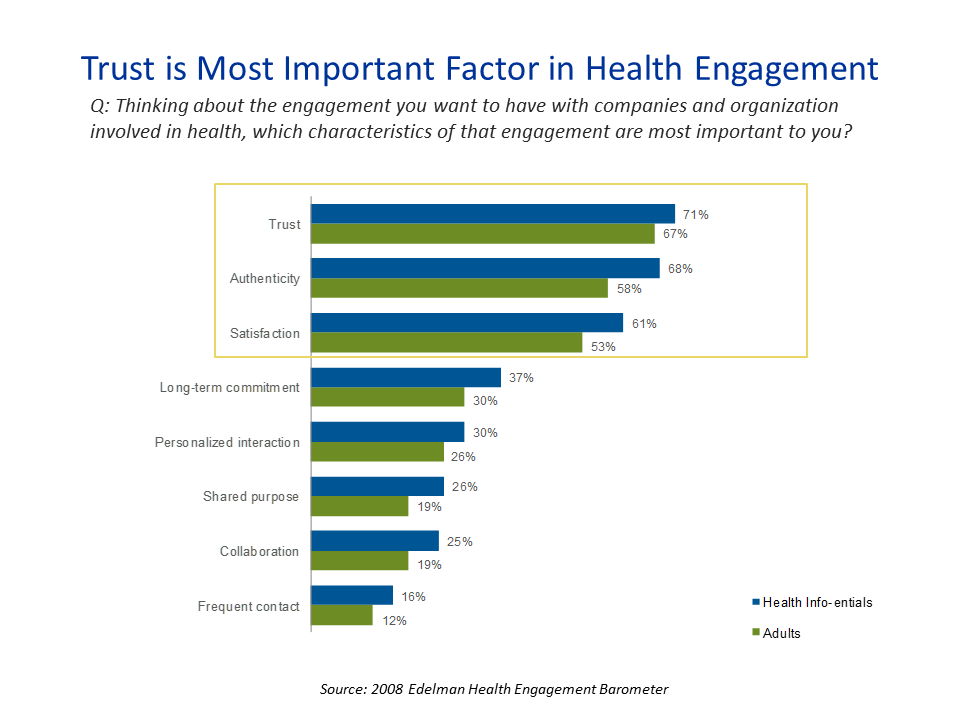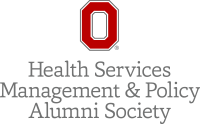 The 2008 Edelman Health Engagement Barometer is out alongside the company’s annual Trust Barometer, and more than ever, people are trusting “people like me” more than they do institutions.
The 2008 Edelman Health Engagement Barometer is out alongside the company’s annual Trust Barometer, and more than ever, people are trusting “people like me” more than they do institutions.
This is the ninth iteration of the Trust survey. The toplines of the past four years show an important change in peoples’ trust perspectives. In 2005, Edelman found that trust in ‘established institutions’ and figures of authority began shifting to peers.
By 2006, “A person like me” was the most credible spokesperson for companies. That year, people trusted employees significantly more than company CEOs. Edelman defines “a person like me” as someone who “shares by interests” and “holds similar political beliefs.”
In 2007, business became more trusted than media and government in every part of the world.
In 2008, younger opinion elites show higher levels of trust in business than older elites. Furthermore, they rely on multiple sources of information to shape their opinions about business. (A definition: “opinion elites” are college educated, in the top 25% of household income in their age group, and are searchers of news and politics.)
Among all industry sectors surveyed, the most trusted in North America are technology (trusted by 79%), biotech and life sciences (trusted by 71%) and banks (with 67% of people trusting them).
The least trusted: insurance (48%) and media companies (44%).
Among “spokespeople” representatives people would trust are:
“A person like yourself”= 60%
Financial/industry analyst = 56%
Academic = 54%
Doctor = 53%
What I find most striking in this survey is Edelman’s segmentation of TrustHolder profiles. Edelman diced the survey data by people’s actions and communications styles. They came up with 4 TrustHolder segments:
- Social networkers = 39% of global elites. 61% of social networkers trust business. Their triggers to action are marketing practices, financial performance, safety track record, environmental record, and health influence. Social networkers are keen on peer conversations along with traditional media. This is the most influential group on friends, family, their professional network, community and online groups.
- Social activists = 26% of global elites, and are activated by community impact and corporate philanthropy. They tend to use online boards and social networking sites along with traditional media.
- Solo actors = 11% of the global elites. They are activated by product/service quality and customer service. They are traditional media folks, and do use Wikipedia.
- Uninvolved people cover 24% of global elites, and consume traditional media and ads.
Health Populi’s Hot Points: The Trust Barometer holds many lessons for health and social marketers. Of utmost importance in health are these factors: people trust other people like themselves; doctors are trusted spokespeople (notwithstanding the debate about Dr. Jarvik’s role as spokesman for Pfizer’s Lipitor, a campaign that lacked the critical fact that Jarvik was not a practicing physician); and, the 39% of elites who are social networkers and are activated by health influences. This cadre of people are the early adopters in health and social media (aka Health 2.0). They also trust business more than government. Now there’s a sweet spot for developing health products and promotions.





 Thank you,
Thank you,  As a proud Big Ten alum, I'm thrilled to be invited to meet with the OSU HSMP Alumni Society to share perspectives on health care innovation.
As a proud Big Ten alum, I'm thrilled to be invited to meet with the OSU HSMP Alumni Society to share perspectives on health care innovation. I was invited to be a Judge for the upcoming CES 2025 Innovation Awards in the category of digital health and connected fitness. So grateful to be part of this annual effort to identify the best in consumer-facing health solutions for self-care, condition management, and family well-being. Thank you, CTA!
I was invited to be a Judge for the upcoming CES 2025 Innovation Awards in the category of digital health and connected fitness. So grateful to be part of this annual effort to identify the best in consumer-facing health solutions for self-care, condition management, and family well-being. Thank you, CTA!